music October 24 Action: Japan japanese music koto shakuhachi wabi-sabi
by Warren
leave a comment
Meta
SiteMeter
Brighter Planet
Playing for the Planet: Elizabeth Reian Bennett and Ayakano Cathleen Read
I have always been tremendously moved by the spare elegance of Japanese classical music. The modal environment triggers my affection for some of the popular Hindustani pentatonic ragas, while the rough edges, empty spaces and fantastically varied qualities of attack, sustain and decay force me into a more Cagean listening space.
This aesthetic of open space contrasts greatly with Indian music’s demand for a continuously saturated surface; as a khyal singer I am always engaged in that supersaturation, and I love it…but at times I envy the sparse and evocative economy of Japanese melodic lines — so different, and yet so similar.
Need I point out that Japan (an island nation) is particularly vulnerable to the rising ocean levels which will be triggered by catastrophic climate change?
The music presented on Saturday night by Elizabeth Reian Bennett, Ayakano Cathleen Read and Charles Hughes was a beautiful glimpse into an ancient tradition rarely heard today. I am deeply grateful for their performance.
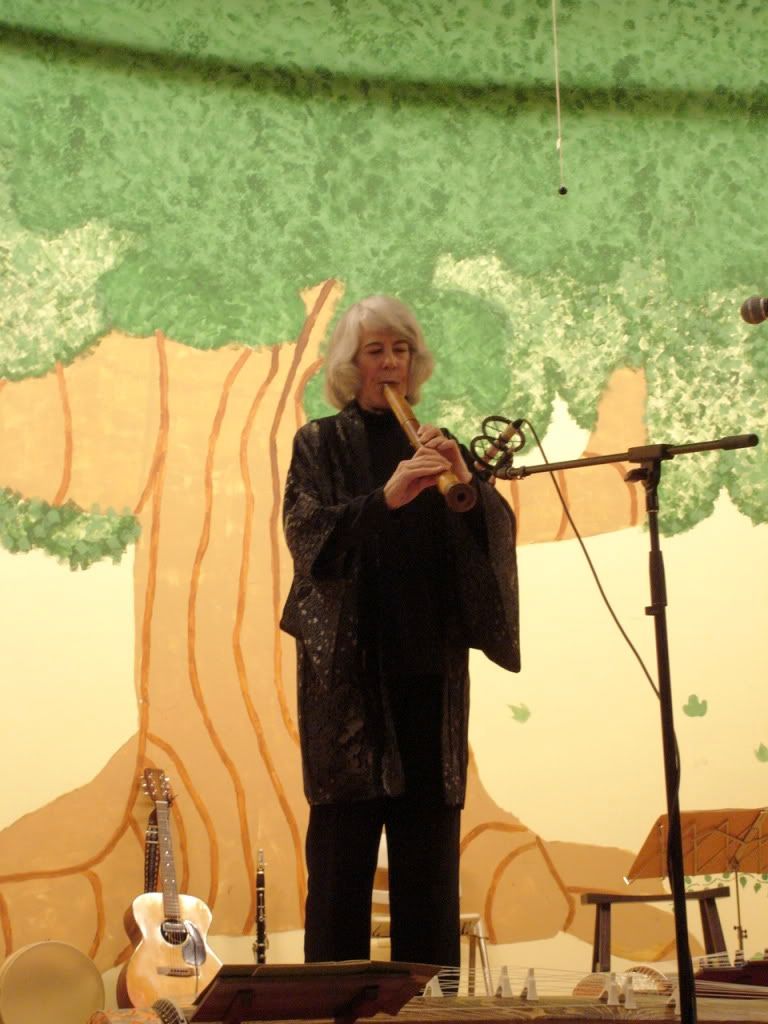
The real cause of global climate change…
…is definitely abortion, gay marriage, and the number of unredeemed heathens out there in the world!
music October 24 Action: balkan music libana sephardic music women's music
by Warren
leave a comment
Meta
SiteMeter
Brighter Planet
Playing for the Planet: Libana’s set
Officially, this was not an appearance by Libana, but rather by “four-sixths of Libana” — two members being unable to attend. According to Sue Robbins, this was the first time in the group’s thirty-year history that this particular combination performed live.
Aside from the obvious fact that these women are superb musicians who put their minds, hearts and souls into their music unstintingly, what can I possibly say?
Well, “thank you” is a good start. Their enthusiasm, their readiness to participate, their profound musicianship…in an evening full of high points, their set was a real delight. I have included their introductory remarks, which do a great job of explaining the material.
Enjoy!

environment Indian music music October 24 Action Warren's music: Gorakh Kalyan khyal Raga
by Warren
4 comments
Meta
SiteMeter
Brighter Planet
Playing for the Planet: Warren Senders’ set
When I first got the idea for the “Playing for the Planet” concert, I knew instantly that I wanted to sing these three compositions in Raga Gorakh Kalyan. I will update later on with the complete text and meaning; tonight I just want to get this posted before I go to sleep.
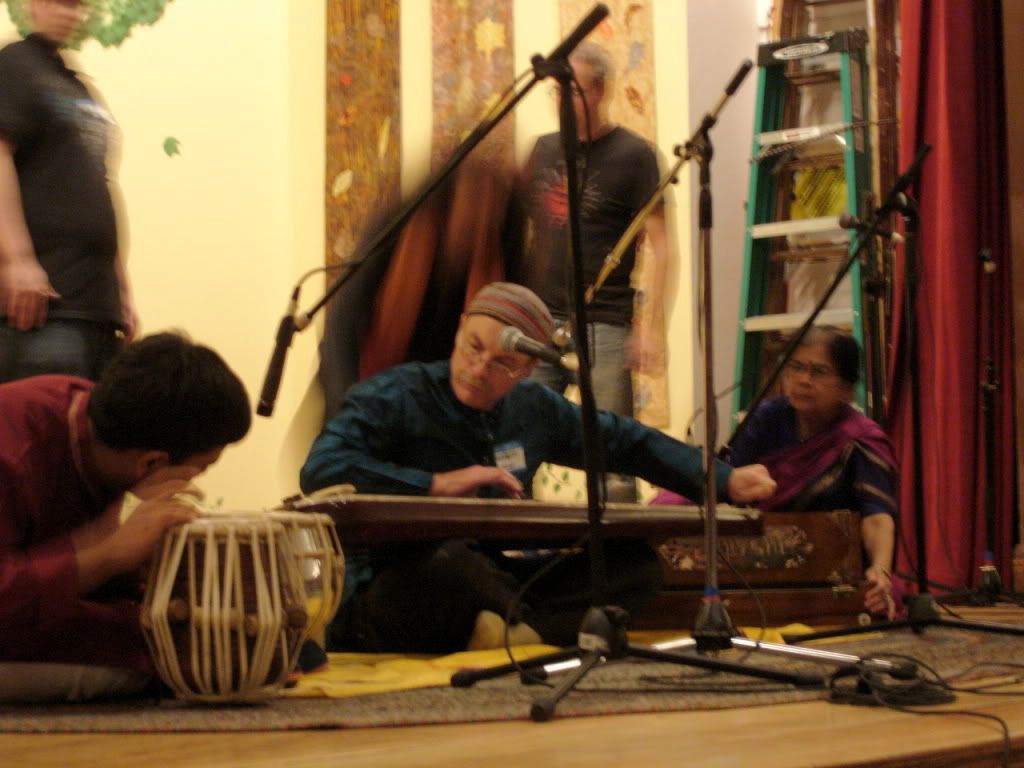
Lying Liars…
…turns out a lot of conservative “grassroots organizations” were just a bunch of temps in a phonebank, gettin’ paid a little over minimum wage to pretend they were real ‘murricans. Who would have guessed?
I won’t be able to watch the hearings tomorrow; have to work. But it should be fun to see Jack Bonner and his flunkies try to spin their way out of this.
music October 24 Action Warren's music: African music Ewe music Ghana
by Warren
1 comment
Meta
SiteMeter
Brighter Planet
Playing for the Planet: The Agbekor Drum and Dance Society
In 1979, I was running the scheduling at “Cambridge Custom Percussion,” the Cambridgeport neighborhood drum shop. Selling the conga drums made by “Conga Jim” VanDenAkker and the ceramic dumbeqs of Betsy McGurk during the day, the shop changed into a small performance and teaching space. I was twenty-one; the youngest member of the ad hoc collective that supposedly ran the place. I was looking for teachers who were interested in giving classes in various styles of group drumming…and that’s how I met David Locke, recently returned from several years’ study in Ghana. He was already teaching at Tufts, but began a regular class at CCP. That class took off; people loved the repertoire, and David was (and is) an exceptional teacher.
After a while, there was enough of a regular group that it became a repertory ensemble, the Agbekor Drum and Dance Society (eventually, if memory serves me right, incorporating as a 501(c)3 non-profit). I was never personally interested in learning the master drum parts; all I really wanted to do was play the kagan, the small high-pitched drum which fills in the offbeats in Ewe music.
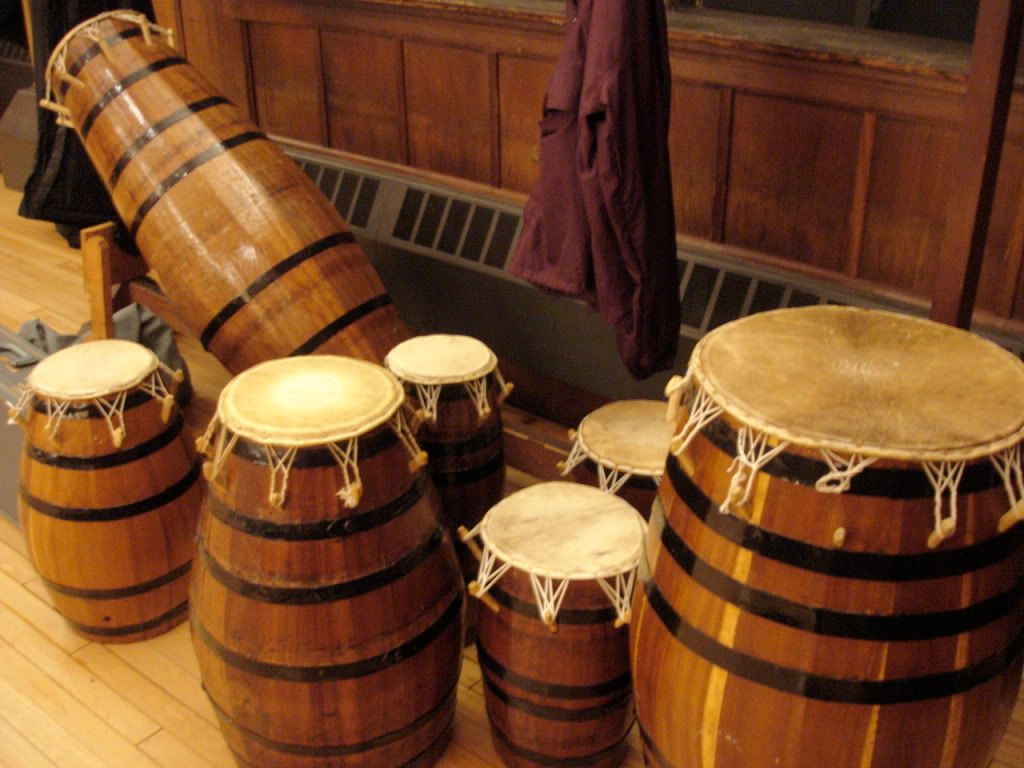
music October 24 Action: Middle-Eastern music oud violin
by Warren
leave a comment
Meta
SiteMeter
Brighter Planet
Playing for the Planet: Beth Bahia Cohen’s set
Beth Bahia Cohen and her accompanists opened the evening with a single twenty-five minute suite which included three separate melodies from different parts of the Middle East. The performance included lots of beautiful violin playing from Beth, a lovely oud solo from Mac Ritchey, and some great percussion from Todd Roach and Gabe Halberg. Rhythmically charged, passionate, lyrical…what a great way to start things off!
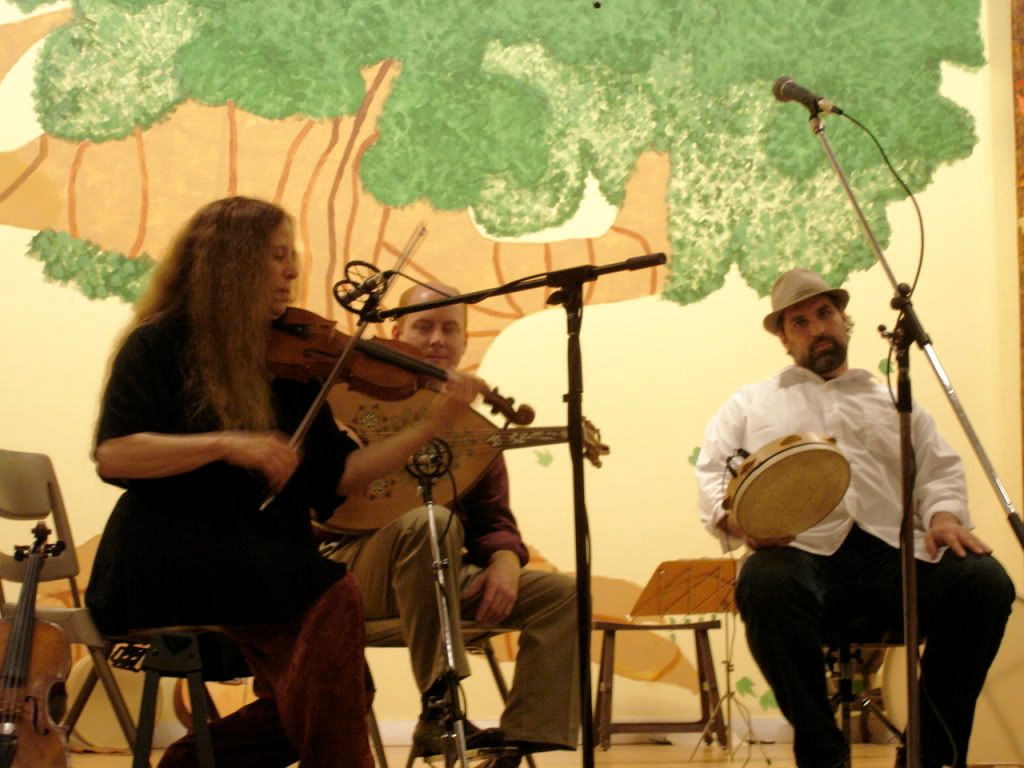
environment Indian music October 24 Action: Dance Indian dance
by Warren
1 comment
Meta
SiteMeter
Brighter Planet
Playing For The Planet: Aparna Sindhoor’s Set
The fifth ensemble to perform (starting at around 9:20 pm) was the Aparna Sindhoor Dance Theater. The room lighting was wretched; even with the videocam on “nightshot” setting there was a lot of detail lost. But nevertheless, the power and genius of Aparna and her ensemble are evident in this video. This is a 25-minute excerpt from their long piece, “The Story and The Song,” about a young woman who could turn herself into a flowering tree and the prince who fell in love with her. The fact that there was a giant painted tree as a backdrop was purely serendipitous.
Here are four photographs (courtesy Hadley Langosey) and video (courtesy the Sony Cam mounted on a tripod, on top of the piano in the back of the room.). The first few seconds of the introduction were lost, but the rest of the performance is intact.
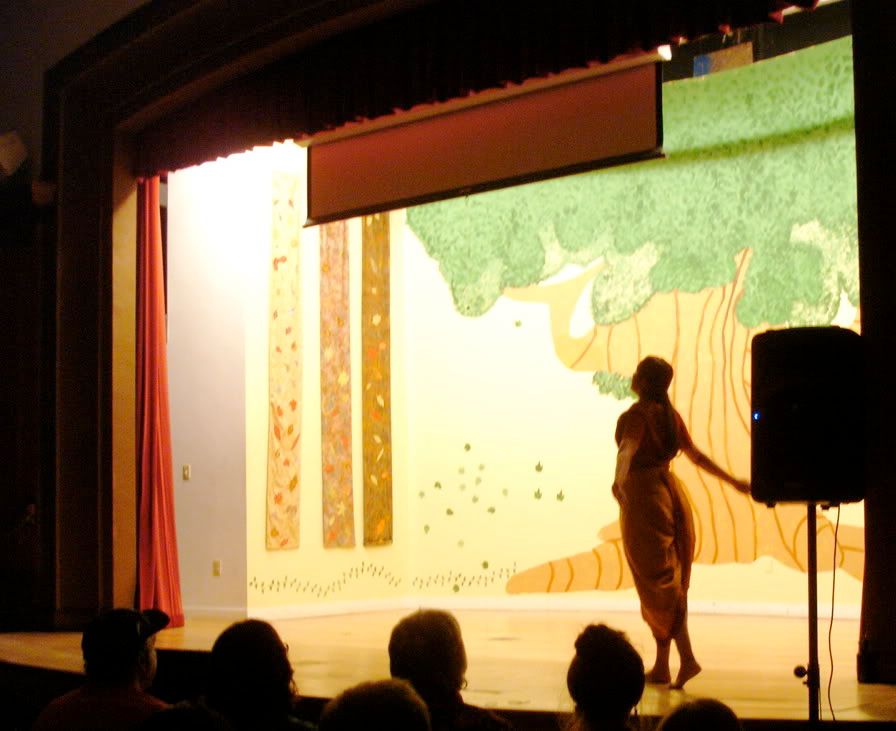
Jazz music Warren's music
by Warren
leave a comment
Meta
SiteMeter
Brighter Planet
Stuff from the Personal Vault: Laughing Moon
The first “band” I ever really gigged with was a free-improvisation ensemble called Laughing Moon. I gather that there is a progressive rock band out there somewhere using that name, which is nice.
I would bet good money, though, that they don’t sound anything like us.
We started out as an ad hoc improvisation group that for a few gigs included guitarist Joe Morris and a drummer named Chris Harvey. Scott Southworth, Sharrhan Williamson (who was then called Beverly or Bev) and I all connected with a wonderful drummer named Tim Roberts. That went on for about nine months; I don’t remember what happened, exactly, but we changed drummers.
Bryan Dennis was a terrific player with an unceasing flow of ideas. His shifting waves of time were tremendously influential in my early development as a bassist. The group played together in this configuration for perhaps a year, when it settled on its final incarnation as a trio.
By its very nature, the music of Laughing Moon was not chock-full of popular appeal. But I recently had occasion to check out one of our old recordings, and I was quite pleasantly reminded of what fun we had, and of how much fun our music was. Now that I’ve found the old recordings (and now that my hard drive has been upgraded so I have room for these projects), I’ve begun putting together some of them with photos.
Herewith, the first batch of Laughing Moon material, unheard since 1979. Thirty years ago, the three of us went into the broadcast studios at WBUR, on Steve Elman’s show “Spaces,” and broadcast a full set of our idiomatic free improvisations.
Indian music music: 78s Gwalior gharana khyal Ramakrishnabua Vaze
by Warren
5 comments
Meta
SiteMeter
Brighter Planet
A Blast from the Past: Ramakrishnabua Vaze (1871-1945)
One of the greatest voices of pre-Independence India, Pt. Ramakrishnabua Vaze was born in 1871:
…in a small village in Maharashtra…Vaze Bua lost his father soon after and was brought up by his mother. He studied for only a few years in school, his passion for music overtaking his interest in studies. With his mother’s help, he spent the next few years, moving around, taking lessons in music from several teachers. He was twelve when he was summoned home to get married and take up his duties as a householder. The newly married Vaze felt it improper to depend upon his mother for financial support and decided to take off on foot, with no particular destination and only the pursuit of music on his in mind.
Link
Note that at age twelve, he decided it was improper to depend on his mother…so he presumably left his wife (who was presumably even younger) at home and went out a-wandering.
At the time, all roads led to Gwalior, where the young man eventually became a disciple of Ustad Nissar Hussain Khan (note: this is not the Nissar Hussain Khan of Rampur-Sahaswan fame). The typical spate of privations, indignities and unswerving dedication eventually led to a level of musicianship and artistry that continues to amaze and inspire.
“His performances were always lively and intellectually stimulating. His layakari was flawless , his taans had clarity and force and he would leave his audience spellbound. He was responsible for bringing many little known ragas to light and as a composer, his specialty was bandishes in fast tempo.” Link
Here are a few of Vazebua’s wonderful short recordings, made during the heyday of 78 rpm discs in India. I’ll add more as I get around to it.
Enjoy!
